As night falls at SGNP, tribals gather to brew illicit liquor; mid-day's extensive investigations over a month reveal how around 20 illicit alcohol brewing units have come up in the woods near Vihar lake
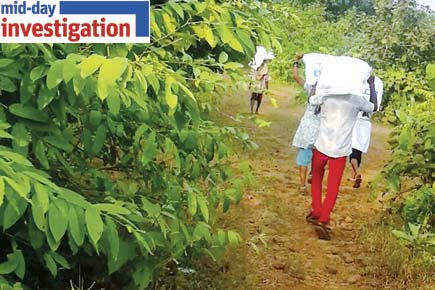
Sanjay Gandhi National Park, SGNP, illicit liquor brewing, tribals, Vihar lake, Mumbai news, mid-day investigation
 Given how the state government repeatedly hikes taxes on alcohol and controls its inflow, it should come as an indignity to it that the city's famous and expansive national park is being abused to brew hooch. The Sanjay Gandhi National Park (SGNP), which shelters a rich diversity of flora and fauna across its 104 square kilometers, faces many perils from poaching to encroachment and human-animal conflicts.
Given how the state government repeatedly hikes taxes on alcohol and controls its inflow, it should come as an indignity to it that the city's famous and expansive national park is being abused to brew hooch. The Sanjay Gandhi National Park (SGNP), which shelters a rich diversity of flora and fauna across its 104 square kilometers, faces many perils from poaching to encroachment and human-animal conflicts.

We spotted a group of locals carrying sacks of jaggery powder a key ingredient to make the liquor towards a den located in the wooded region behind Film City
But mid-day’s latest investigations have unearthed a new adversary to the protected forest: alcohol-brewing units (ABU) operating illegally inside the park premises. Tribal dwellers in the area sought assurances of anonymity before telling mid-day that there are, currently, close to 20 illegal ABUs in operation at different spots in the jungles.

We watched from a distance as tribals prepared the barrels and the firewood for the brewing process
The majority, however, are near Vihar lake and the forested patch around Saibhangoda and famous Maroshipada, both near Aarey Milk Colony on the circumference of SGNP. While the ABUs are common knowledge, the tribals are not ready to speak much on the subject, leading mid-day to hazardous encounters in our bid to uncover the locales of the illegitimate distilling and distribution of locally made alcohol.
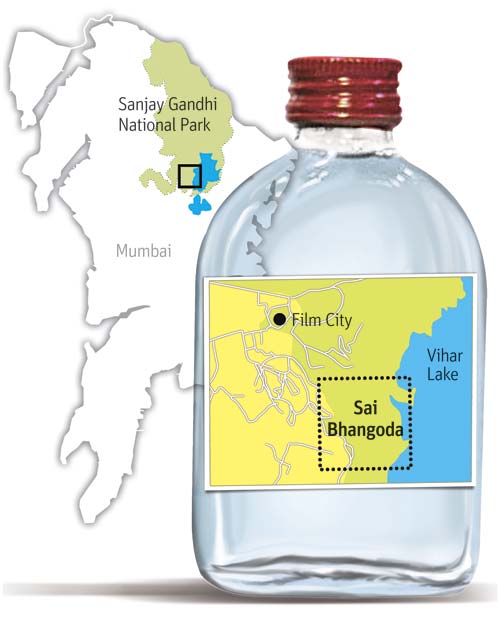
Recce
After staking out the area for almost a month, our team inferred that the operations are cleverly carried out in the cover of dark. There is little evidence of the activity during the day, as soon after brewing a barrel, the area is completely cleaned out.
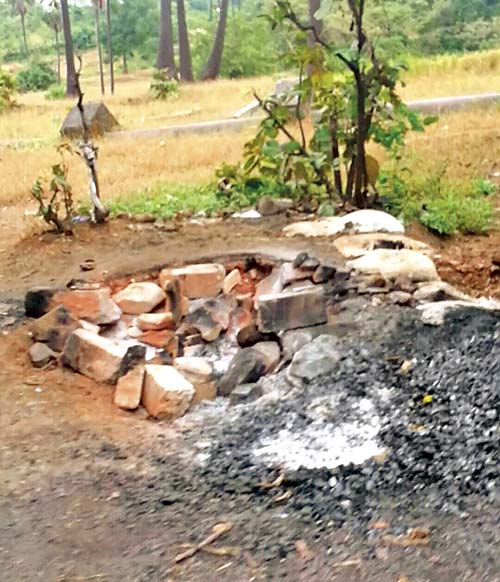
The makeshift stove created with bricks to boil the blend
The principal activity usually starts after 6 in the evening. The local goon who runs the business has a firm hold over tribal hamlets or padas in the jungle, and a small army of men and women to tend to the process. While many signboards around Vihar lake, near Saibhangoda, prohibit public entry to the spot, we found that the place is easily reachable after a 20-minute walk via a trail passing from Maroshipada and another from Saibhangoda.

The trail that passes via Saibhangoda area and leads up to Vihar lake
The water body is a hot spot for those looking to down liquor by the lakeside. Striding through the Saibhangoda trail, we found a makeshift heating apparatus, essentially a chullah. The size and shape of the stone-and-brick stove seemed conducive to the process of concocting liquor. Fresh coal, ash and semi-charred sticks could be seen lying around. A tribal confirmed our suspicion that this was the site of manufacture.
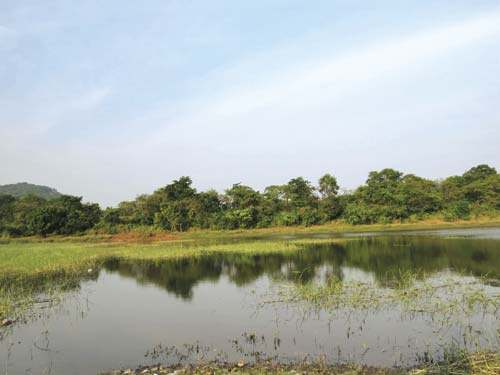
In March, in a joint operation by the excise, forest department and police, 18 illegal alcohol-making units were destroyed in Saibhangoda near Vihar lake. According to locals, however, close to 20 units have restarted operations in the same locale
Spot visit at night
In order to verify the local’s claim, we risked a visit to the location one night late in October, pretending to be in search of hooch. Once we entered the Saibhangoda pada, many locals gruffly asked where we were going.
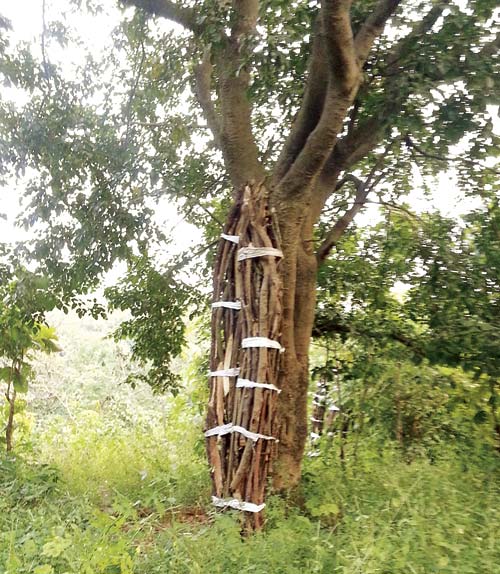
Clusters of sticks to be used as fuel for the stove; trees are often chopped heedlessly to procure firewood for the kiln
Walking to the lake via the trail, we were followed by a man and a woman. After around 10 minutes, we finally came upon the liquor den, where the manufacturing process was in progress. Shortly, three women came to us and curtly asked us to leave right away, making threats.
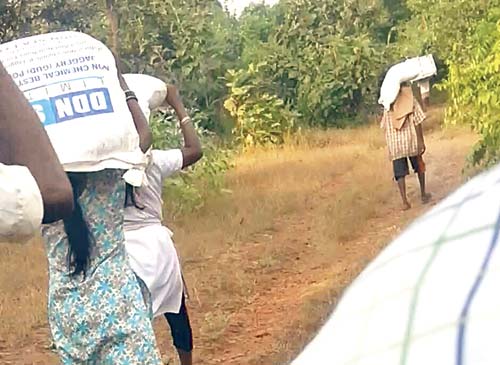
Distribution
The liquor is then stored at the tribal dwelling, the pada in Saibhangoda, until the early hours of morning, and then allegedly ferried to country liquor bars, or sold in illegal dens in the area that mostly cater to labour-class customers and the locals. To dodge checks by the police, some workers use the hollow under their bike seats to transport the liquor.
Transporting the make
We made believe as if we were leaving, but hid behind the trees at a distance, watching the liquid simmering to a boil on the huge stove, after which it was poured in blue-and-black barrels 50 litres in capacity and transported from the kiln to the pada, which is 10 minutes away. The women were made to carry the barrels on their heads, but the pitch dark did not allow for capturing any of this activity on camera. At times, though, the alcohol is ingeniously transported in tyre tubes.
Second visit
On our second visit around five days back, locals from adjoining padas told us there were close to 20 illegal brewing units in the forests near Vihar lake. The dens are usually set up close to water bodies, as the process consumes a lot of it. A few of them are on the foothills of the mountain behind Film City.
We could see water being carried in containers to the dens. Around 4.30 pm, we spotted some men and women carrying sacks of jaggery powder a key ingredient to make the liquor on their heads to another den located in the woods behind Film City.
As we forged ahead, two young men shouted out for us to stop, then tried to snatch our camera and check the photos. We told them we were bird-watchers. Failing to figure out the functions of the high-end contraption, they thrust it back at us, and asked us to leave, but not without enunciating a threat: “No one is allowed to come here except our people, and don’t you dare click pictures of anything or you won’t get out of the forest on your legs.”
Retracing our steps, we finally came upon a group of men in the act of making liquor, starting with cleaning a vast cylindrical container in which illicit liquor would be prepared. We managed to aim our cell phone camera from our hiding place in the underbrush and make a video. But within a minute people at the site came to us and asked us to go away.
Illegal cutting of trees
People involved with the ABUs are also involved in the rampant destruction of trees inside the protected forest. During our recce we found that trees had been hacked at many places to obtain firewood that could be used for boiling the brew. Tied bundles of sticks were seen resting against trees.
Profits
One ABU makes about 300-400 litres of alcohol. The production cost is very low, considering that the location, the water and firewood is free. The 50-kg bag of jaggery powder the locals were seen carrying costs Rs 1,800-2,000 and is enough to yield 400 litres of alcohol.
The dough earned by selling it is more than twice the amount spent concocting it. There are also smaller packets of liquor with a capacity of 180 ml. They are referred to by the locals as ‘pavsher’, and sold for R18 at country liquor shops. At the spot, though, the packs go for cheaper at Rs 8-15.
 Subscribe today by clicking the link and stay updated with the latest news!" Click here!
Subscribe today by clicking the link and stay updated with the latest news!" Click here!







